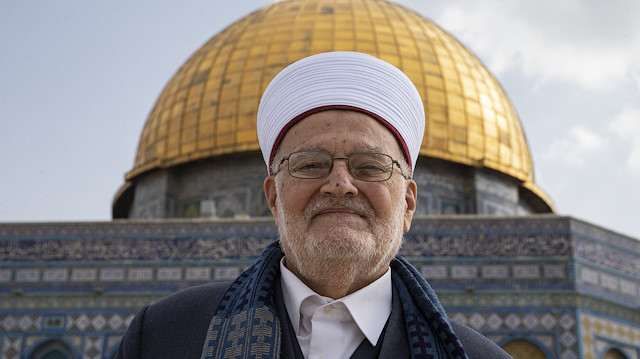

Grand Mufti of Jerusalem Sheikh Ekrima Sa'id Sabri
Political figures have shown solidarity with Sheikh Sabri after Israel's banning him from entering Al-Aqsa Mosque
Sheikh Ekrima Sabri, the grand mufti of Jerusalem, managed Friday to enter the flashpoint Al-Aqsa Mosque, despite an earlier Israeli ban.
According to Anadolu Agency correspondent on the ground, Sabry was accompanied by many of Palestinian lawyers and activists.
On Thursday, Sabry warned against the Israeli targeting of what he described as "the religious symbols" in the occupied city.
In a press conference he had held, Sabry said: "The Israeli occupation undermines our freedom of expression by saying that we trigger incitement against the occupation."
"When we say that Al-Rahma gate is an integral part of Al-Aqsa Mosque, they [Israelis] consider it as an incitement," he stated.
Political and religious figures from Jerusalem gathered Thursday in support for Sabri, who was banned by the Israelis to pray at Al-Aqsa Mosque.
Observers say the Israeli accusations against Sabri are politically-motivated to curb the man's activism which aims at "exposing the Israeli violations" in the city.
"I told them [Israelis] during the investigations that our position is clear, we will keep defending our right at Al-Aqsa," he asserted.
Israel occupied East Jerusalem, in which Al-Aqsa Mosque is located, during the 1967 Middle East war.
In a move never recognized by the international community, Israel annexed the entire city in 1980, claiming it as the self-proclaimed Jewish state’s “eternal and undivided” capital.
Sacred to Muslims, Christians and Jews, Jerusalem is home to the Al-Aqsa Mosque, which for Muslims represents the world's third holiest site. Jews refer to the area as the “Temple Mount,” claiming it was the site of two prominent Jewish temples in ancient times. The complex also includes Church of the Holy Sepulchre, one of the most sacred Christian sites in the world.
#al-Aqsa
#Grand Mufti
#Israel
#JERUSALEM
#Palestine
#Quds
#Sheikh Ekrima Sabri

